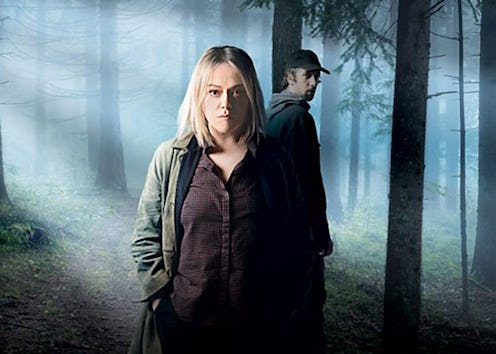Entertainment
Kidnapping Dramas Are So Gripping For This Strange & Unexpected Reason

The much-hyped new BBC crime drama Hidden unpacks a dark crime at the heart of a rural Welsh community — the kidnapping and imprisoning of a young woman. Twitter was quickly ablaze with speculation and theorising on the outcome, and there have been a number of reviews praising this taut, tense drama. But what is it about kidnapping stories that fascinates us so much? In fact, why are we obsessed with kidnapping stories full stop?
Long before Hidden came along, kidnapping films and TV shows have dominated the big and small screen for years. The Emma Donoghue novel Room was so popular it was adapted into an Oscar-nominated movie, telling the story of a young mother and her son held in a backyard cell (the son is a product of rape by the kidnapper). Then there's of course Taken, The Collector, Trapped, Kiss the Girls, Ransom, and a whole load more. Producers have obviously cottoned onto the fact that the world seems to enjoy a good kidnapping story, but my question is that given their grisly and often tragic subject matter, why?
According to assistant professor of psychology at Northwest Missouri State University Chase O'Gwin, the reasons behind us watching these narratives are complicated — and not quite what you might expect. "There is a dark assumption tied in with this," O'Gwin says, "which is that it must be a kind of perverse Machiavellian glee to be had in watching the suffering of others."
However, he believes it might be quite the opposite impulse, one in which people position themselves with the victim. "When people are made to vicariously live an experience, it forces them to ask questions of themselves, 'What would I do? This couldn’t really happen to me, could it? I’m a good/smart person and bad things like this can’t happen to me, can they?'"
O'Gwin thinks there is a strange enjoyment to be found in doing this sort of soul searching — with fans of these shows exploring whether the story they're watching confirms or challenges their beliefs. He also suspects that some even watch these shows as a kind of social commentary.
"With many people being unhappy in today’s political landscape," he says (referring to Brexit in the UK and Donald Trump's government in the US), "and feeling like they have been trapped in a place that is antithetical to where they would like to be, people find enjoyment in the metaphorical escape of the victims." Perhaps these escapes allow viewers the vicarious thrill or projecting how they might escape from their own situations?
The makers of Hidden have admitted that they were inspired by real life incidents in creating the programme. "As part of our research," series co-creator Mark Andrew told the BBC, "we looked at true crime abduction cases. From the Ariel Castro kidnappings to the Jaycee Dugard and Natascha Kampusch abductions. We wanted to build a grimly realistic portrait of a serial offender."
The real life incidents Andrew was referring to are the tragic high-profile cases of Californian schoolgirl Jaycee Dugard, who was kidnapped at the age of eleven in 1991, and found 18 years later, and the case of Natascha Kampusch, an Austrian girl kidnapped at the age of 10 in 1998, who escaped in 2006, eight years after being taken. O'Gwin believes there is a natural fascination with these kinds of terrible crimes, stemming from our inability to consolidate the idea of a seemingly normal human being with a person capable of such a monstrous act. "We are drawn to try and figure out how such a thing exists," he expands. "It seems like one mode of being should preclude the other."
And while it might seem like these stories form part of a cultural trend, O'Gwin thinks there is something timeless, and almost folkloric, in our interest in these cases. "I think narratives like these have been around for a long time because they speak to our own senses of own captivity," he says. "They give us hope in the darkness, whether it is hope of rescue by another or inspire courage for the princess to kick the dragon’ ass herself. These stories have been cycling around for a long time."